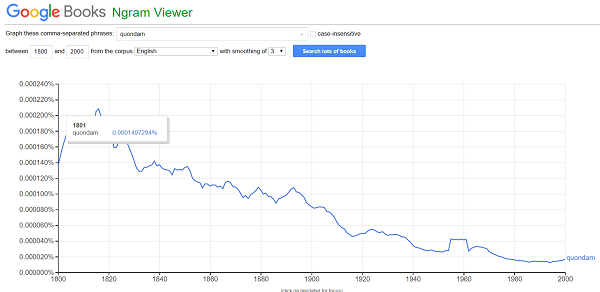When I think of words that might be new to me, I imagine nouns or verbs. Or at least words that are relatively new, like maybe ones that have appeared in the last 50 years. (I have list of Friday words; judge for yourself.) So I was surprised this week to encounter a very old adjective: the word quondam.
This came up in a tweet by the BBC writer Pádraig Belton, in which he talks about the "quondam British Sector" in Berlin:
Seriously, how could I be today years old and never have heard of this word? A trip to the dictionary reveals that it means "former, one-time." Merriam-Webster has a nice note about the word (Looking for an unusual and creative way to say "former"?) in which they list even more obscure synonyms (whilom, ci-devant, or preterit) before suggesting the old-sounding but still-used erstwhile.
Because quondam gave me a mild case of lexical insecurity, I searched the Corpus of Web-Based English, which incorporates (get it?) texts from 20 English-speaking locales. This assuaged my doubts slightly—in a collection of 1.9 billion words, quondam appears only 49 times. Slightly to my surprise, it shows up the most in US-based texts, though that might be the result of how the corpus was built, dunno.

(Click to embiggen)
Moreover, an Google ngram search shows us that quondam has been in decline right from the earliest books in that corpus:

(Click to embiggen)
Anyway, I'm happy to have learned a pretty old and rare word. Now I'll have to think about whether I should use it myself and thereby do my little part to help rescue it from complete obscurity.
Word origins! I live in Seattle and ride the light rail as part of my commute. Not only does the line terminate at the University of Washington, one of the stops downtown is the unrelated University Street. (I pity the tourists who are trying to sort this out.) Staring at the map while commuting finally got me thinking about where we got the word university. I mean … universe, right? Must be related, but how?
 The uni- part means "one," of course; we see it in unique and union and unite, and more distantly in one and only. The -verse part means "to turn," which we see in words like versus and verse and invert. So university and universe are grammatically different takes on the idea of "turn(ed) into one" (see also: "E pluribus unum"). In the academic sense, a university is a community of scholars.
The uni- part means "one," of course; we see it in unique and union and unite, and more distantly in one and only. The -verse part means "to turn," which we see in words like versus and verse and invert. So university and universe are grammatically different takes on the idea of "turn(ed) into one" (see also: "E pluribus unum"). In the academic sense, a university is a community of scholars.
This surprised me: in English, university is the older term, having appeared in the 1200s in Anglo-Norman, and which makes it about as old as the oldest university. The Romans had a term universum to mean the sum of things, but we apparently didn't take up the word universe in English till the late 1500s. As near as I can tell, the word universe doesn't appear in the King James Bible (1611); I guess (?) they used the word creation for the same concept.
An aside: the word varsity is just a shortened form of university. All the sources I looked at suggested that the -ar- in varsity (instead of -er-) is the result of the same process that gave us varmint from vermin and parson from person. That thar is an interesting fact indeed.
Like this? Read all the Friday words.
 |
|

 |
|
